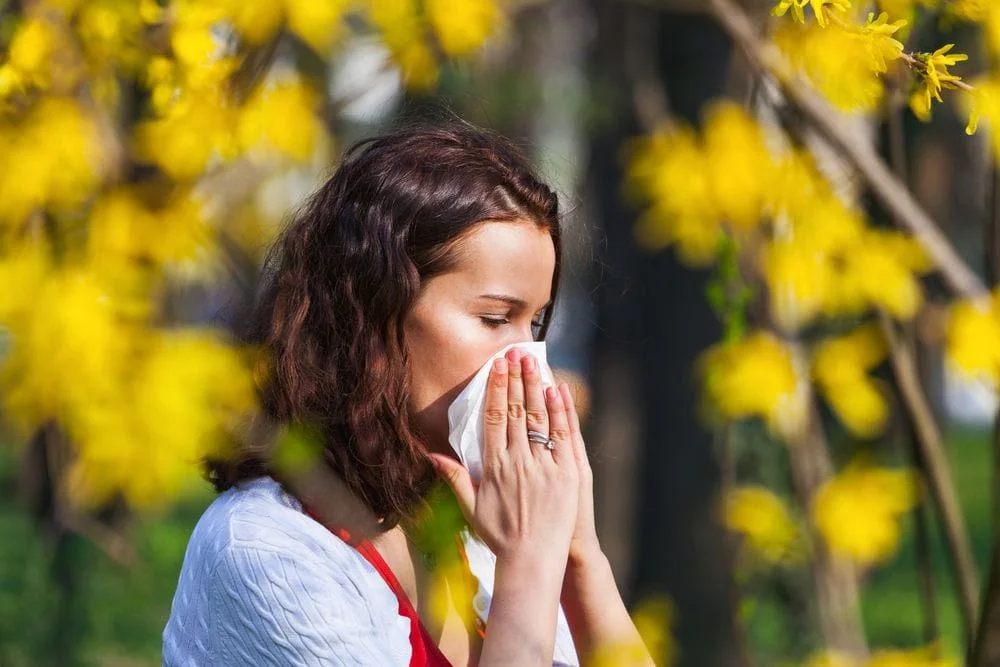Eye Allergies Treatment – From Your Allentown Optometrist
According to the American College of Allergy, Asthma, and Immunology, there are an estimated 50 million seasonal allergy sufferers in the U.S. Many of these allergy sufferers experience eye allergy symptoms, including red eyes, swollen eyelids, watery and itchy eyes. Eye allergy symptoms can even play a part in eye infections such as pink eye. As your Allentown optometrist, we can help you manage eye allergy symptoms – providing effective solutions for your eye allergy needs.
Common Allergens – Pollen, Pet Dander, Dust and Mold
While it is possible to be allergic to many different substances, pollen, pet dander, dust, and mold are the four most common airborne allergens. Eye allergies can also result from products people use such as eye drops or cosmetics.
Options for Treating and Preventing Eye Allergies
There are a number of different ways that you can minimize your eye allergy symptoms, both through prevention and treatment. Some of them include:
Avoidance
Many of the allergens that cause eye allergy symptoms can be avoided through awareness and preparation. Most weather reports, including weather apps, will provide information on daily allergens like pollen and mold. Many will give specific details about the type of pollen or allergens that are high on a particular day. Once you understand what you are allergic to, you can attempt to minimize your exposure – by staying inside, using an air filter or even wearing a disposable mask and wraparound eye protection when you go outside.
Eye drops
Mild eye allergy symptoms can often be treated using over-the-counter eye drops. There are a number of different products available that help to minimize the itchiness, redness and other symptoms that occur during allergy season.
Wearing Eyeglasses
If you are used to wearing contacts year-round, you may be making your symptoms worse during allergy season. The many airborne allergens that appear during allergy season can accumulate on the surface of your contacts, irritating your eyes and increasing your symptoms. By wearing eyeglasses during allergy season, you provide some protection to your eyes and avoid the eye allergy problems associated with contact lens wear.
Prescription Medications for Eye Allergies
If you experience eye allergy symptoms that are not relieved by avoidance and over-the-counter medications, you may benefit from prescription medication prescribed by our optometry team. There are a wide variety of medications available through prescription. The main categories include:
- Antihistamines
- Decongestants
- Steroids
- Nonsteroidal Anti-Inflammatories
- Mast Cell Stabilizers
Each category of medication is designed to treat eye allergies differently. Some medications may be more effective than others depending on your specific allergies. Our optometry team can give you a full eye exam to determine what type of medication is best suited to your situation. And if one does not provide relief, we can try different strategies until we help you find relief!
Contact Us For Your Eye Allergy Needs
Please contact our eye care team to schedule your next eye exam, call us at (610) 432-3258. We are here for all your eye allergy and vision care needs.
Our Allentown Optometrists Provide Relief for Eye Allergies
During spring and summer, many people start spending more time outside; however many people also suffer from seasonal allergies during this time as well. Eyes start watering, their head gets congested, and they can't stop sneezing. Those who are tired of dealing with allergies every year are relieved to find help from our Allenstown optometrists here at Lehigh Valley Eye Care Associates.
Understanding the Nature of Common Eye Allergens
Eye allergies occur when the body is exposed to various types of allergens. Some of the most common include pollen from multiple trees, weeds, grasses, and plants. These allergens typically get worse during the spring and summer months and can affect individuals whenever they go outside.
However, there are also many indoor allergens that people don't consider. These include pet dander (hair, skin, and even droppings), dust mites (the tiny creatures that live in and eat dust), and mold. These allergens can often combine with outdoor allergens to create a very uncomfortable living environment.
That said, other irritants can make allergies worse without causing an actual allergic reaction. These include various types of perfume, exhaust from vehicles, and cigarette smoke. While most people aren't allergic to these irritants, they will affect the eyes and can make an allergic reaction more intense.
How These Items Cause Various Eye Allergies and Allergic Reactions
When allergies occur, they are the result of the body trying to protect itself. That's because they view these allergens as dangerous foreign invaders and activate the immune system to eliminate them. During pollen season, many eye allergy sufferers experience watery eyes the moment they step outside. The body causes this reaction (and a stuffy nose and sneezing) to expel these allergens from the body.
As a result, eye allergy relief is necessary for people who suffer from this problem. Treatments such as allergy eye drops can prevent these frustrating reactions. Understanding more about the various types of treatment methods available for your optometrist is crucial for ensuring maximum relief.
Eye Allergy Relief from Your Allentown Eye Doctor
There are various types of prescription medications, including specialized allergy eye drops, that can help prevent allergic reactions. These treatments include oral antihistamines that suppress the chemical (histamine) that causes allergic reactions. Decongestants can also help break apart the nasty stuffy-head feeling that can be so painful to manage. Mast cell stabilizers can also prevent the release of histamines while nonsteroidal anti-inflammatory drugs help manage allergic swelling.
Beat Allergies With Help From Our Allentown Eye Doctors
Contact us at Lehigh Valley Eye Care Associates to learn more about eye allergy relief. Call our Allentown optometry office at (610) 432-3258 to get access to high-quality and knowledgeable staff who care.

